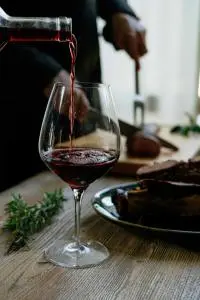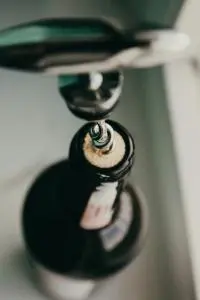Uncork, refresh and decant a Loire wine
Unclogging like a pro
Before serving a Loire wine, here are a few tips on how to properly uncork your bottle, refresh it and decant it if necessary.
Cut the capsule.
Historically, to avoid contact with the lead/tin alloy that could impart a taste to the wine, it was customary to cut the capsule below the ring, or even in the middle.
It can also be cut above. New plastic or aluminum caps often feature a tab under the neck ring of the bottle.
A capsule cutter will allow the overcap to be cut very cleanly.
Opening the wine
Use a corkscrew (also called a sommelier's knife in the jargon) with a wide spiral with at least 5 turns.
Insert the corkscrew sufficiently to avoid breaking the cork during removal.
The worm of the corkscrew must never pass through the cork during uncorking.
How do I refresh a wine?
Refresh wines in a bucket, basin or Ice Bag, with a large volume full of cool water into which ice cubes are gradually added, avoiding direct contact between the ice and the glass.
For rapid cooling, use ice wraps that are slipped around the bottle. Only young, uncomplicated wines can be stored in the fridge.
Why and how to decant a wine?
The operation of decanting wine consists in oxygenating a young wine that needs to take air to better reveal its terroir, its aromas, its personality. Decanting allows for accelerated aging, particularly for wines consumed a little before their peak date.
For this, clear glass decanters with wide bottoms are recommended.
But beware, wine does not keep well in a carafe. Drink within 24 hours. We recommend decanting a wine an hour or two before serving, to release all the aromas. We also decant aged wines to separate the solid part (tannins and colorants) from the liquid. We prefer decanters with little flare to avoid too much contact with the air.
To note:
Powerful, racy white wines also deserve a decanting.
Olderly wines are fragile and need to be handled with care. It is advisable to pour them gently into the decanter under sufficient lighting (candle, lamp) to discern the deposit and stop in time.
The basics for serving wine like a sommelier!
If you serve your wine in a bottle, opening it an hour beforehand won't change its properties unless you remove a small amount to increase the surface area in contact with the air. This also allows you to taste the wine and determine whether it needs decanting. It's a good idea to smell the glass before use to make sure there are no stray odors (dishwashing liquid, cardboard, etc.)
First serve a base of wine in your own glass, taste it and then serve your guests.
To taste, fill the glass only a third of the way.
At the table, it's recommended to fill the glass nearly halfway. Filling your guests' glasses to the brim is a laudable intention, but prevents them from playing their role as aroma channelers. Filling the glass to one-third or one-half of its height will enable it to retain the sometimes volatile aromas floating on the surface of the wine in its upper part.
The wine is served to the right of your guests, holding the bottle by the body, without placing it on the rim of the glass...Ideally!"

At what temperature should wine be served?
Dry white and rosé wines: 6/8°C
Dry to sweet white wines: 8 to 12°C
Light reds: 14/16°C
Structured reds: 15/17°C
Fine bubbles: 6/8°C
A serving temperature that is too cool will attenuate both the qualities and the defects of the wine.
If the wine's temperature is too high, the fruity taste will be lost, and the heat of the alcohol will dominate.
To check the temperature, a word of advice : use a wine thermometer. Several kinds are available in specialist stores: classic glass, electronic, liquid crystal, they ensure that wines are served at the right temperature.
Some practical tips before serving your wine.
To remember!
The corkscrew, the first step to successful wine tasting!
The fridge and wine don't mix!!
Carafing isn't automatic!
The right decanter, for the right wine! A young or old wine needs the right equipment
The right serving temperature changes everything!
In the glass, a reasonable quantity for optimal tasting!!
Loire Wines wish you happy tasting!!

